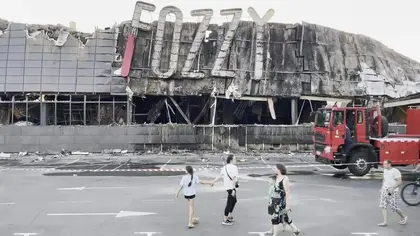There is something beyond military strategy in the recent attacks on Odesa. For the first 500 days, the city suffered rocket and drone attacks (not counting the few cannon shots fired by Russian ships, when they could still get close enough to Odesa’s shores), which almost always targeted military objectives. The attacks on electricity distribution plants also followed a utilitarian plan.
Many attacks also hit outside the city, throughout the region. It seemed as if the Russian command wanted to show that it was only targeting Ukrainian soldiers, not Odesa’s Russian-speaking citizens. As if the Russians expected the city’s inhabitants to welcome them warmly, despite the civilian casualties and destruction.
JOIN US ON TELEGRAM
Follow our coverage of the war on the @Kyivpost_official.
After all, in Odesa’s municipal elections of autumn 2020, the pro-Putin Opposition Bloc garnered the most votes in the first round (20 percent), only to be defeated in the second round.
It must have been a surprise for Russians to see how Odesites reacted with disdain to these attacks.
However, since mid-July 2023, the attacks have reflected a shift in Moscow’s intention. Previously, the port had only been touched sporadically, both in order to fulfil the grain deal and in the hope of capturing the city with its infrastructure intact. Now, along with the port, the Russians are attacking the logistical activity of the city, the operators who manage Ukraine’s trade with the world.

UNESCO Officially Responds to Odesa’s Letter in Defense of ‘Polyphonic Cosmopolitanism’
In other words, Russia has set out to destroy the economic soul of the city.
Similarly, the destruction of the Orthodox Cathedral of the Transfiguration on July 23 was an attack on Odesa’s spiritual soul. Paradoxically, the Russians hit a church consecrated by Kirill, Patriarch of Moscow as well as Putin’s supporter in the invasion of Ukraine.
Also on that night, many rockets targeted the historic center, with its 19th-century buildings. It was clearly an attack on the religious and cultural heart of Odesa.
Finally, a gigantic fire destroyed the largest supermarket in the city, belonging to the Fozzy chain, very popular among citizens for their daily shopping. Prior to this, they had hit the huge “7-kilometer” market. A direct attack on Odesites’ purses, on their belly.
Ironically, if this and other supermarkets had been attacked in the first weeks of the war, it would have been a demoralizing factor, because all of us in Odesa were afraid that food distribution would cease. Today it is too late.
Why these attacks on the head, heart and belly of the city? Perhaps the “pearl of the Black Sea” is for the Russians like a very beautiful woman who rejects you. Desired, but unfaithful. They consider it their property, due to past historical and cultural ties. But since they can no longer have her, they do as a mafia boss would do with his lover: he scars her, so that no one else can enjoy her.
This is the code of honor of mafia gangs, well known to the leader of the Russian Federation, who grew up in the environment of the St. Petersburg’s criminal gangs.
You can also highlight the text and press Ctrl + Enter






